Diarrhoea in chickens. What causes it and how to deal with it.
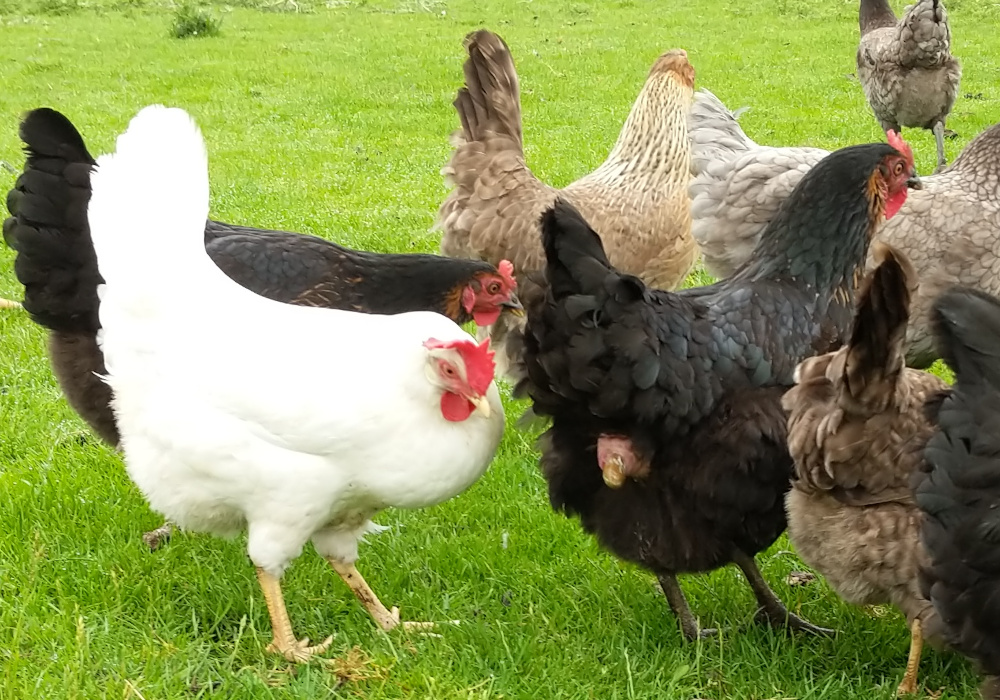
The intestinal tract is very short in birds and chickens are no exception. Chickens also have limited kidney function and most of the water and salt control in birds is accomplished in the gut.
Table of Contents
- What does normal chicken poop look like?
- What does chicken diarrhoea look like?
- How do you know if your chickens have diarrhoea?
- What gives chickens diarrhoea?
- Different colours of chicken diarrhoea:
- What foods give chickens diarrhoea?
- Can lice, mites or parasites cause diarrhoea in chickens?
- Can humans get diarrhoea from chickens?
- Viral diseases that cause diarrhoea in chickens:
- Common bacterial diseases that cause diarrhoea in chickens:
- Management and environmental factors that Causes Diarrhoea:
- Home remedies for chicken diarrhoea:
- Treatment of diarrhoea in chickens:
What does normal chicken poop look like?
Chickens have a common opening for pass dropping and urinating.
There are two types of normal chicken droppings, one is brown and has a white cap on it and the other is a ceacal void which is lighter in colour and very loose in texture.
Below: This is a normal everyday chicken poop, the white cap is urate or urine crystals.
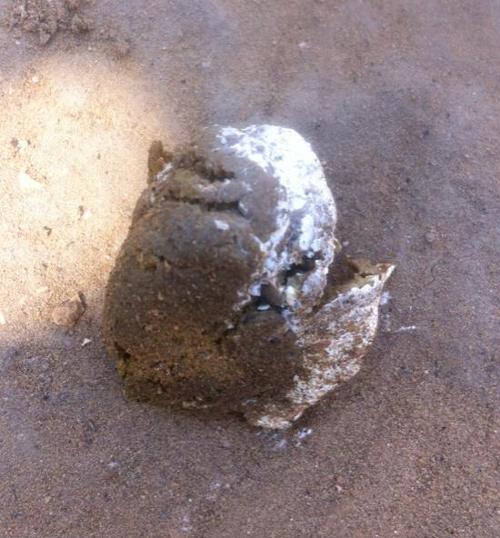
Below: This is a ceacal poop, it is thin brown and smelly.
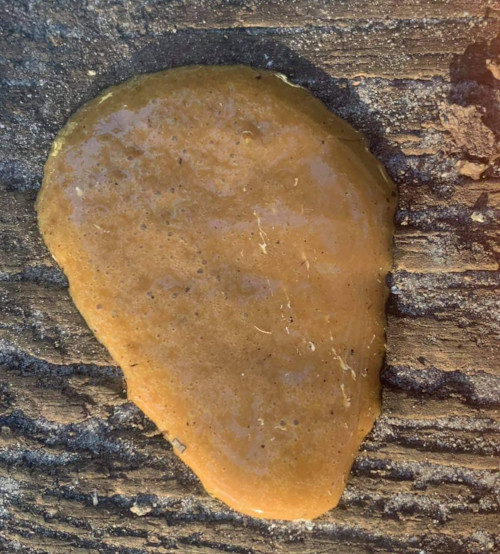
It is not normal for chickens to have diarrhoea and chicken poo should not be runny. The exception to this is caecal droppings.
A caecal dropping is loose and foul-smelling and lacks white urine crystals and is produced when the chickens empty their ceacal pouches. The caeca pouches in chickens are where fermentation of fibre takes place.
What does chicken diarrhoea look like?
Chicken diarrhoea can be a variety of colours and textures.
Below: Watery diarrhoea.
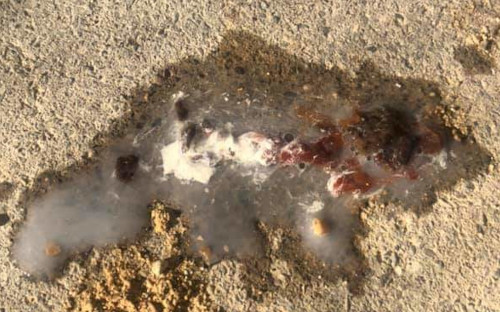
How do you know if your chickens have diarrhoea?
Diarrhoea in chickens is defined as the passing of three or more loose or liquid stools per day.
You can tell if your chickens have diarrhoea because they will have dirty vent feathers and be passing more than the average number of runny stools per day.
What gives chickens diarrhoea?
Diarrhoea in poultry is caused by:
- Infectious and non-infectious diseases,
- Viruses,
- Excess protein in the diet,
- Excess carbohydrate or fibre in the diet,
- Hot weather or heat stress,
- Kidney damage,
- Parasites,
- Medications,
- Toxins and poisons.
There are a lot of causes of diarrhoea in chickens and birds can be lost to it.
Different colours of chicken diarrhoea:
When the dropping is thin in consistency and has foul-smelling it is diarrhoea.
Brown: This is the typical shade of chicken faeces. Assuming you observe a large quantity of tow-coloured droppings that smell to high heaven you presumably have a broody hen. Loose brown coloured droppings can be caecal droppings and these have a foul smell.
Brown coloured and thin in consistency: Usually a sign of diarrhoea. It is usually caused by a higher water intake but can be caused by bacterial infections.
Black: This indicates bleeding higher in the digestive tract due to damage to the upper part of the intestine. The black colour droppings is also seen when the chicken consumes wood ash, blueberries, and blackberries.
Red and Orange: this occurs due to slogging of the intestine shed into faeces. It also indicates fresh blood is dropping usually seen in coccidiosis or lead poisoning.
Green: The green colour of faeces seen in bacterial and viral diseases. This colour also indicates when the bird is off feed and dehydrated.
Yellow. This colour of dropping due to the intake of large quantities of corn. This is also seen in egg yolk peritonitis. Egg yolk can be absorbed in faeces and give a yellow colour.
White diarrhoea, watery and creamy discharge. This is due to cloacal vent discharge but it is not diarrhoea.
What foods give chickens diarrhoea?
Some foods of too much of one type of food can give chickens diarrhoea.
Foods that can chickens diarrhoea include:
- Excess sugary fruits like melons.
- Some berries like elderberry.
- Too much of foods high in fibre like whole oats.
- Excessively salty foods like popcorn or salted nuts.
- Giving too many treats.
- Cakes, pastries and other sugary or salty human foods.
Insects like meal or earthworms do not give chickens diarrhoea, chickens evolved to eat insects as part of their diet.
Diatomaceous earth does not cause diarrhoea in chickens.
Chickens have been seen to eat frogs, shrews, mice and other small animals , none of which will give chickens diarrhoea.
Can lice, mites or parasites cause diarrhoea in chickens?
Some internal parasites can cause diarrhoea in chickens. External parasites do not directly cause diarrhoea in chickens but can spread diseases which might.
Below: Internal parasites visible in chicken poop.
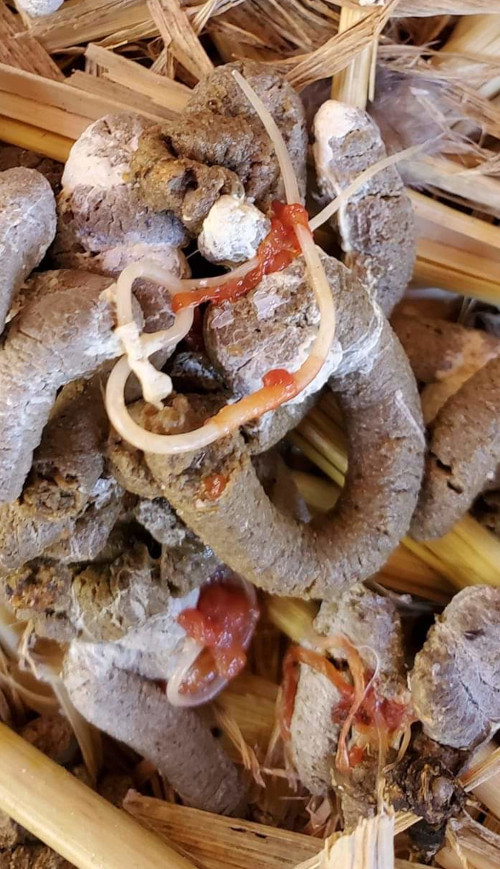
Can humans get diarrhoea from chickens?
Yes. Humans can catch some infections from chickens that cause diarrhoea. Do not kiss your chickens and wash your hands after handling them.
Viral diseases that cause diarrhoea in chickens:
These viral infection listed below are all known to give chickens diarrhoea.
- Newcastle Diseases (ND) is a viral disease of many kinds of poultry, wild, and cage birds characterised by marked variation in morbidity, mortality, signs, and lesions. It causes severe diarrhoea. The colour of the faeces is green.
- Avian Influenza produces clinical diseases showing neurological signs, depression, anorexia, diarrhoea, and sudden death.
- Infectious Bursal Diseases (IBD) is an acute highly contagious viral disease of young chicks. Clinical disease is observed only in birds after 3 weeks of age and sudden onset of disease. Depression, anorexia, ruffled feathers, and drooping wings. The chalky white diarrhoea and dehydration and sometimes voiding of blood and straining during defecation. Vent picking is usually common and may be self-inflicted.
- Avian astroviruses are common, endemic viruses of chickens. They mainly affect young birds, causing enteritis, diarrhoea, and growth retardation, although some can be vertically transmitted, causing hatchery disease.
- Mareks Diseases ('MD' or 'fowl paralysis') is a very common disease of chickens caused by a herpes virus. Mareks disease affects both commercial and backyard poultry.
There is no proper treatment for viral diseases. Give antibiotics for the prevention of secondary bacterial infection. You can also give supportive treatment like multivitamins, electrolytes, and liver tonic to the chicken.
Common bacterial diseases that cause diarrhoea in chickens:
Colibacillosis refers to any localised or systemic infection caused entirely or partly by avian pathogenic Escherichia coli (APEC). Droppings are green with white to yellow urates because of anorexia and dehydration.
Pullorum disease is an infectious, egg-transmitted disease of poultry, especially chicks often characterised by white diarrhoea and high mortality in young chicks and by asymptomatic adult carriers. There is anorexia, white adherent diarrhoea with pasting of the vent area, huddling near heat sources, and shrill chirping.
Fowl cholera is a contagious disease affecting domesticated and wild birds. It is characterised by white watery or green mucoid diarrhoea.
Management and environmental factors that Causes Diarrhoea:
Stress can likewise cause diarrhoea. Chickens are effectively anxious about a change or new occasions occurring around them. For instance, adding new chickens to the group, or changing their feed.
Whenever they have settled down everything ought to get back to business as usual, if it doesn't you should examine further.
Heat stress can also cause diarrhoea. During hot weather, your chickens will drink more and eat less which causes watery diarrhoea. Treatment is to make sure your chickens have access to cool, clean fresh water with added vitamins and electrolytes.
Antibiotics also cause diarrhoea when given for a long period. Normally this will just influence those being treated. Treatment is to give probiotics to restore the bacteria in the gut of the chicken. A small quantity of yogurt or fermented feed should be given.
Coccidiosis is caused by protozoa which can cause with extensive damage to the intestinal mucous lining in the gut and severe diarrhoea sometimes with blood. Treatment is to give anticoccidial drugs to the chickens, multivitamins and electrolytes in feed and water.
An over-burden of worms can cause severe diarrhoea. You might even have the option to see the worms in their droppings.
Ingestion of toxins and poisons. Chickens are interested in most things, which can cause them problems. They are vulnerable to mycotoxins from wet bedding material or mouldy feed.
Chickens can be vulnerable to a wide variety of toxic plants and different poisons as well.
Home remedies for chicken diarrhoea:
If your chicken has diarrhoea or suffering from the loose stool. The following precaution was adopted at home.
Isolation - The first step is to isolate your chicken from the healthy flock because some diseases are infectious, they move from one bird to another bird. They have great economic losses.
Give comfortable Environment - Keep your chicken in a comfortable place. The temperature of the house should be maintained and keep your chicken out of wind, sun, and rain. The bedding should be dry and changed properly.
Give plain feeds like layers pellets or mash.
Give multivitamin and electrolytes in the water.
Oregano oil is useful in treating poultry.
Probiotic feeds like fermented chicken feed is helpful in restoring the balance of the digestive system.
Diagnose the condition accurately. You should diagnose the disease properly before it is treated. You should consult your veterinarian.
Treatment of diarrhoea in chickens:
- Keep sick chickens separate from the rest of the healthy flock.
- Give proper access to water and feed with no treats.
- Maintain proper temperature, humidity, and bedding of the chicken.
- If it is bacterial then you give a broad-spectrum antibiotic to your chicken and also give supportive treatment that helps to boost the immunity. The supportive treatment is multivitamin and electrolyte. Also give clean, cool water and feed.
- Provide your disease chicken with a plain, grain based balanced diet. Add a few drops of oregano oil to their feed twice a day. This helps to provide energy. Oregano oil is also a natural antibiotic that helps to improve immunity.
- Mix electrolytes in the water and offer that water to the chicken instead of plain water. This helps to improve their acid-base balance and improve their feed intake. The home-made electrolyte recipe is to mix one teaspoon of potassium chloride, 1.5 teaspoons of baking soda, and three teaspoons of table salt and mix it with 3 litres of warm water and use in place of water for one week.
- Add probiotics in their feed that help to improve the digestive microorganism. For this purpose, you also add a small amount of yogurt to their feed. Keep in mind to avoid dairy products because they worsen the condition.
A vigorous sanitation program should be followed when raising poultry. Insofar as is possible, all disease, parasitism, and other stresses on a flock should be minimised.
Dust should be controlled.
Only feeds free of faecal contamination should be fed to poultry. Pelleted feeds are more likely to be free of contamination.
